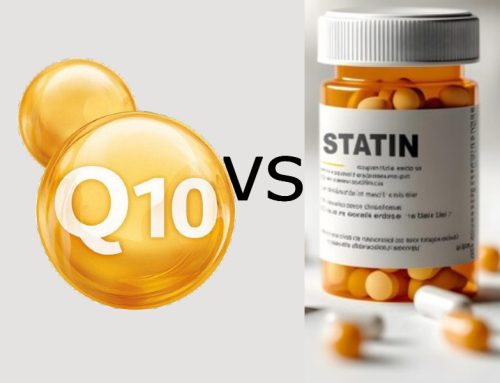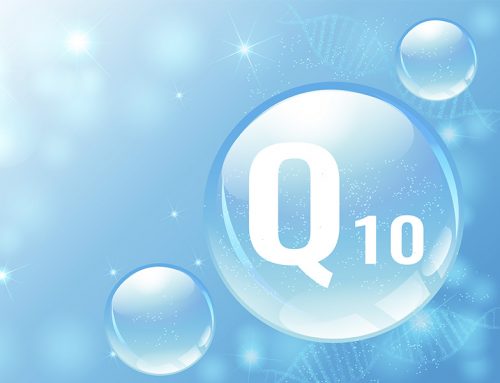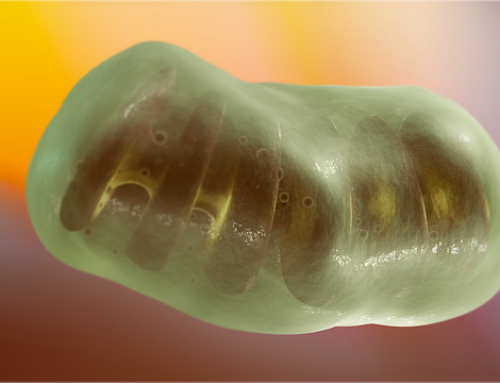
The Coenzyme Q10 supplements with the best documented results in randomized controlled trials have been manufactured under national-level pharmaceutical control.
Recently, I read a published review of the research literature about the nutritional and therapeutic supplement Coenzyme Q10. It was very interesting to see what the research has revealed and to see what the authors of the review chose to emphasize [Potgieter].
Coenzyme Q10 supplements confer the following known health benefits:
- improve the symptoms and survival of heart failure patients
- provide antioxidant protection to patients taking statin medications
- help to lower high blood pressure
- maintain good heart function in middle-aged and elderly people
- provide heart health benefits to people with diabetes
Normal unsupplemented levels of plasma Coenzyme Q10
First off, there is wide variation in the plasma Coenzyme Q10 concentrations of individuals who are not taking Coenzyme Q10 supplements. There are many factors that influence any one individual’s Coenzyme Q10 status:
- age
- biochemical differences
- body composition and weight
- diet
- exercise
- genetic factors
- medication regimens
There is some evidence that ethnic origin may affect the absorption of Coenzyme Q10 to an extent [Kelsey]. So far, there do not seem to be any studies showing sex differences in the absorption of Coenzyme Q10.
Roughly speaking, we expect a normal healthy adult to have an unsupplemented plasma Coenzyme Q10 concentration close to one microgram of Coenzyme Q10 per milliliter of plasma [Potgieter]. In a normal distribution, then, we might expect that 68% of adults would have plasma Coenzyme Q10 levels ranging from 0.7 to 1.3 micrograms per milliliter and 95% of adults to have plasma Coenzyme Q10 levels ranging from 0.4 to 1.6 micrograms per milliliter.
And, again, roughly speaking, we expect that unsupplemented patients with advanced chronic heart failure would have plasma Coenzyme Q10 levels at the bottom of the range: 0.4 – 0.6 micrograms of Coenzyme Q10 per milliliter of plasma for the most part. Similarly, most unsupplemented patients taking a statin medication might be expected to have plasma Coenzyme Q10 concentrations considerably below one microgram per milliliter.
But there is much variation among individuals, and there are many factors at work.
Rationale for supplementation with Coenzyme Q10 supplements
Supplementation with Coenzyme Q10 is necessary for a basic biological reason: as we progress from our 20s into middle age and beyond, our bodies synthesize less and less Coenzyme Q10 for us [Kalén]. It is very difficult to make up the loss from food alone [Potgieter]. We would have to eat prodigious amounts of foods containing Coenzyme Q10 to do so [Judy].
Meanwhile, our cells continue to depend upon Coenzyme Q10 as an important factor in the process of ATP energy production. Moreover, Coenzyme Q10 serves as perhaps the body’s most important lipid-soluble antioxidant, reducing the extent of oxidative damage to lipids, proteins, and DNA [Littarru].
The rationale for the Coenzyme Q10 supplementation of chronic heart failure patients is equally straightforward. Research results have shown Coenzyme Q10 deficiencies in heart disease patients. The severity of heart disease increases with the greater deficiency of Coenzyme Q10 in the heart muscle tissue. The Coenzyme Q10 deficiency can be remedied with adjuvant treatment consisting of daily doses of Coenzyme Q10 [Folkers].
The safety of Coenzyme Q10 supplements
The authors of the review conclude that Coenzyme Q10 supplements have a remarkable safety record with a very low rate of adverse effects. Coenzyme Q10 supplements have been tested at a wide range of daily dosages, ranging from 30 and 60 milligrams up to 2400 milligrams per day [Potgieter].
It is especially interesting that there have not been more frequent adverse events at dosages of up to 1200 milligrams per day than at dosages of 60 milligrams per day. And the rate of adverse events has been consistently very low – in many studies no more or not significantly more adverse events in the Coenzyme Q10 treatment group than in the placebo group. Coenzyme Q10 is, practically speaking, about as safe as water.
The observed safe upper intake level for Coenzyme Q10 has been set at 1200 milligrams per day. Higher daily intakes may well be equally safe, but they have not been thoroughly tested. In one study, patients were treated with 2,400 milligrams of Coenzyme Q10 daily for 12 months without any safety concerns [Beal].
Furthermore, one study has shown that Coenzyme Q10 supplementation did not influence the clinical effect of warfarin medication [Engelsen]. Two other studies have shown that type-1 and type-2 diabetics can take Coenzyme Q10 supplements without obvious risk of hypoglycemia [Henriksen, Eriksson].
Typical daily dosages of Coenzyme Q10
Based on what we know from studies of the supplementation of normal healthy adults and the adjuvant treatment of chronic heart failure patients with Coenzyme Q10, some rules of thumb would seem to be as follows:
- Healthy adults in their 30s, 40s, middle age, and senior years: 100 – 200 milligrams per day with meals (200 milligrams divided into two daily doses)
- Patients taking statin medications: 200 milligrams per day with meals (200 milligrams divided into two daily doses)
- Chronic heart failure patients: 300 milligrams per day with meals (300 milligrams divided into three daily doses)
Summary
We have documented evidence of the following facts about Coenzyme Q10:
- plays an important role in both cellular energy production and antioxidant protection of the cells
- is produced less and less in the body as we age
- is further inhibited in its bio-synthesis by effect of statin medications
- is available in food only to a limited and insufficient extent
- is clearly necessary in sufficient quantities for good heart health
- may yield even greater effects when combined with a high selenium yeast supplement [Alehagen]
Read our key article about CoQ10 and cardiovascular health in elderly people
Sources
Alehagen, U., & Aaseth, J. (2015). Selenium and coenzyme Q10 interrelationship in cardiovascular diseases–A clinician’s point of view. Journal of Trace Elements in Medicine and Biology, 31157-162.
Beal, M. F., Oakes, D., Shoulson, I., Henchcliffe, C., Galpern, W. R., Haas, R., & Boyar, K. (2014). A randomized clinical trial of high-dosage coenzyme Q10 in early Parkinson disease: no evidence of benefit. JAMA Neurology, 71(5), 543-552.
Engelsen, J., Nielsen, J. D., & Winther, K. (2002). Effect of coenzyme Q10 and Ginkgo biloba on warfarin dosage in stable, long-term warfarin treated outpatients. A randomised, double blind, placebo-crossover trial. Thrombosis and Haemostasis, 87(6), 1075-1076.
Eriksson, J. G., Forsén, T. J., Mortensen, S. A., & Rohde, M. (1999). The effect of coenzyme Q10 administration on metabolic control in patients with type 2 diabetes mellitus. Biofactors (Oxford, England), 9(2-4), 315-318.
Folkers, K., Vadhanavikit, S., & Mortensen, S. A. (1985). Biochemical rationale and myocardial tissue data on the effective therapy of cardiomyopathy with coenzyme Q10. Proceedings of the National Academy of Sciences of the United States of America, 82(3), 901-904.
Henriksen, J. E., Andersen, C. B., Hother-Nielsen, O., Vaag, A., Mortensen, S. A., & Beck-Nielsen, H. (1999). Impact of ubiquinone (coenzyme Q10) treatment on glycaemic control, insulin requirement and well-being in patients with Type 1 diabetes mellitus. Diabetic Medicine, 16(4), 312-318.
Judy, W.V. (2017). Private Communication.
Kalén, A., Appelkvist, E. L., & Dallner, G. (1989). Age-related changes in the lipid compositions of rat and human tissues. Lipids, 24(7), 579-584.
Kelsey K. T., Ross D ., Traver R.D . et al. (1997). Ethnic variation in the prevalence of a common NAD(P)H:quinone oxidoreductase polymorphism and its implications for anticancer chemotherapy. Br J Cancer, 76:852–854.
Littarru, G. P., & Tiano, L. (2007). Bioenergetic and antioxidant properties of coenzyme Q10: recent developments. Molecular Biotechnology, 37(1), 31-37.
Potgieter, M., Pretorius, E., & Pepper, M. S. (2013). Primary and secondary coenzyme Q10 deficiency: the role of therapeutic supplementation. Nutrition Reviews, 71(3), 180-188.









Leave A Comment